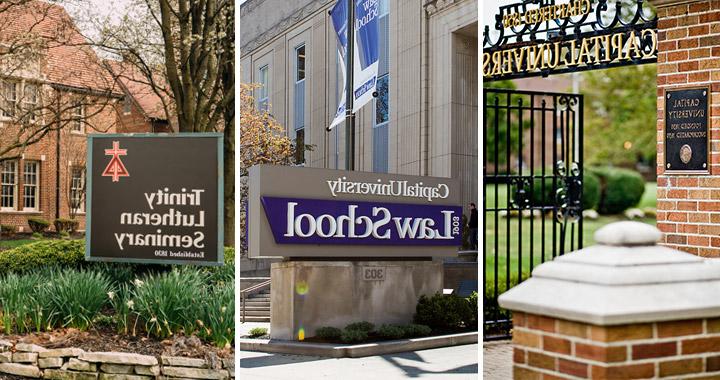Each month, Capital University takes immense pride in showcasing the remarkable accomplishments of our faculty, staff, and students. These achievements, ranging from groundbreaking research and innovative projects to significant contributions in various fields, reflect the vibrant intellectual community and commitment to excellence that define our institution. Join us in applauding these milestones and the individuals who are not only advancing their respective disciplines but also shaping the future of our university and community.
Congratulations to Dr. Paul Hopkins (education) and education students Rosie Cornell, Grace Estes, Fran Longano, and Patrick Vennemeyer who presented Elevating the Voices of our Teacher Candidates at the Ohio Confederation of Teacher Education Organizations fall conference. Their presentation offered insight from the professor's and candidates’ perspective about the teacher education journey. Their presentation was part of the conference's theme, Thriving in an Era of Change: Creating, Advocating, & Celebrating. The Capital students shared how their spirit of resilience and innovation defines the teaching profession. Many professors and state leaders who attended the conference session remarked how informative it was to hear from Capital students about how we can transform the educational process for future teachers. One Dean of Education shared with Dr. Hopkins, "It was exciting to hear so eloquently from your (Capital) students about what they are experiencing in the classroom and in their field placements. Their firsthand perspective is exactly what we need to hear in order to implement meaningful change." Nicely done!
Congratulations to The Rev. Dr. Rachel Wrenn (seminary), who presented two papers at the Society of Biblical Literature Annual Conference. The first paper, Simmering Ire, Slanted Speech: How the Psalmists Express Anger at God, examined the emotional state of the psalmists using the text’s own prototypical script of anger to identify anger in the text in order to stay grounded in the text itself. Wrenn argued that “We will never know in this life anyway what the authors of these ancient poems were actually thinking or feeling. We can know, at least somewhat, when we’re wrong in our assumptions. Further, hearing the implicit cries of anger allow us to experience more fully the complex experiences of the powerless and marginalized characters in the biblical text. It also forms us as scholars to hear the implicit cries of anger of those who are powerless and marginalized in our society. Hearing the anger-talk of those who have been silenced by the structures of a society, whether or ancient or modern, is valuable scholarship for the sake of the world. Some might even call it holy work.”
The second paper that The Rev. Dr. Rachel Wrenn (seminary) presented at the Society of Biblical Literature Annual Conference was Emic Markers of Anger at God in the Psalms. Wrenn said that “Giving this paper allowed me to participate in a larger scholarly conversation than I have currently been able to access. It was a wonderful experience of stimulating intellectual discussion and great networking with others who are studying similar topics.” Kudos for this excellent scholarship.
Congratulations to Dr. Jennifer Larson (biology) and Dr. Annie Witzky (biology) were awarded OhioLink OER Course Redesign Grants to explore the use of open educational resources (OERs) for their Introductory Biology courses starting fall 2025. Larson said that “These grants provide OER expertise and training to identify and use quality OERs in place of expensive textbooks, making access to learning resources for students in their classes more equitable.” Many thanks to Larson and Witzky for doing this important work.
Congratulations to Dr. Nate Whelan-Jackson (philosophy) who published More than Merely Present: Mobile Maps and Agency in the City in The Journal of Philosophy of Disability. In this work, Whelan-Jackson interrogated what we mean when we suggest that a technology serves the interests of accessibility. Using e-mapping technologies as an example, he investigated to what extent they might support a distinctive exercise of agency in city spaces. Whelan-Jackson said about the project, “I am hopeful that this kind of research might expand our ideas about disability and meaningful accessibility, as well as help us to think about what's significant and valuable about city life.” Nicely done!
